Business Law Case Study: Analyzing Discrimination and Ethical Dilemmas
VerifiedAdded on 2023/04/24
|5
|861
|274
Case Study
AI Summary
This case study analyzes the United Automobile Workers v. Johnson Controls, Inc. case, focusing on the company's policy of barring fertile women from working in its battery manufacturing sector due to lead exposure risks. The analysis examines the ethical dilemma faced by the court, balancing the Pregnancy Discrimination Act of 1978 and the Civil Rights Act of 1964 against the company's concerns for worker safety and potential legal liabilities. The study evaluates the discriminatory nature of the company's policy, suggesting that informing women workers about the health hazards and allowing them to make their own decisions would be a more appropriate approach.
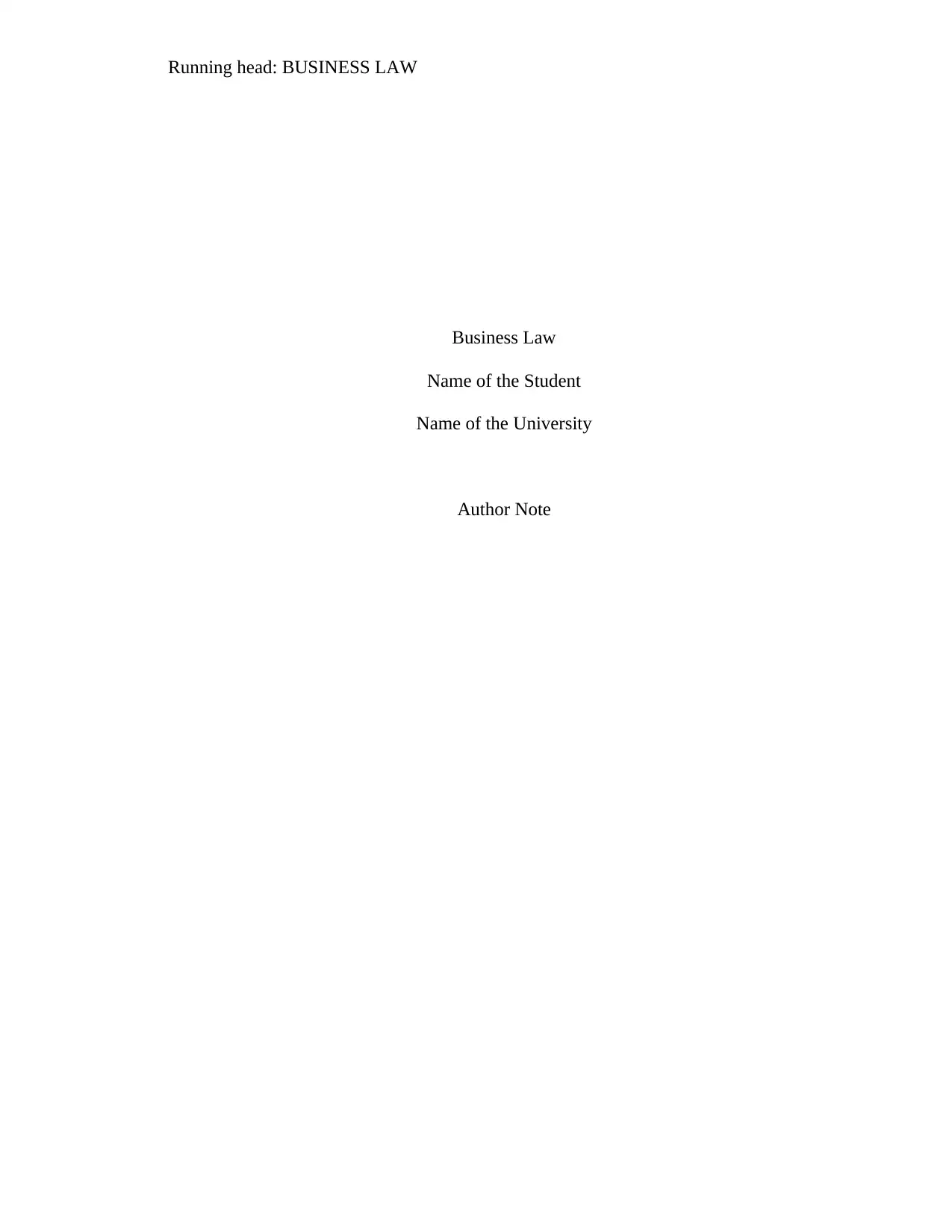
Running head: BUSINESS LAW
Business Law
Name of the Student
Name of the University
Author Note
Business Law
Name of the Student
Name of the University
Author Note
Paraphrase This Document
Need a fresh take? Get an instant paraphrase of this document with our AI Paraphraser
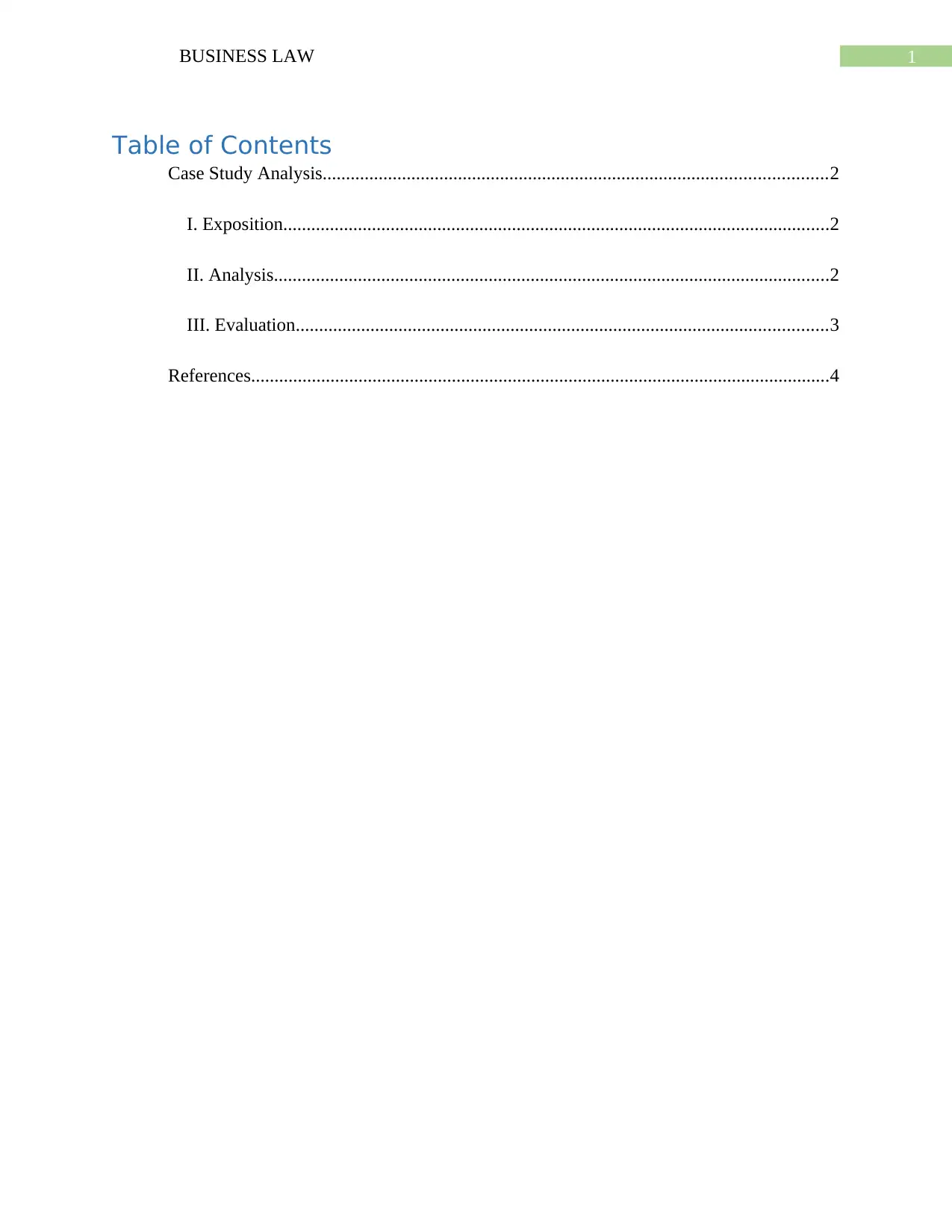
1BUSINESS LAW
Table of Contents
Case Study Analysis............................................................................................................2
I. Exposition.....................................................................................................................2
II. Analysis.......................................................................................................................2
III. Evaluation..................................................................................................................3
References............................................................................................................................4
Table of Contents
Case Study Analysis............................................................................................................2
I. Exposition.....................................................................................................................2
II. Analysis.......................................................................................................................2
III. Evaluation..................................................................................................................3
References............................................................................................................................4
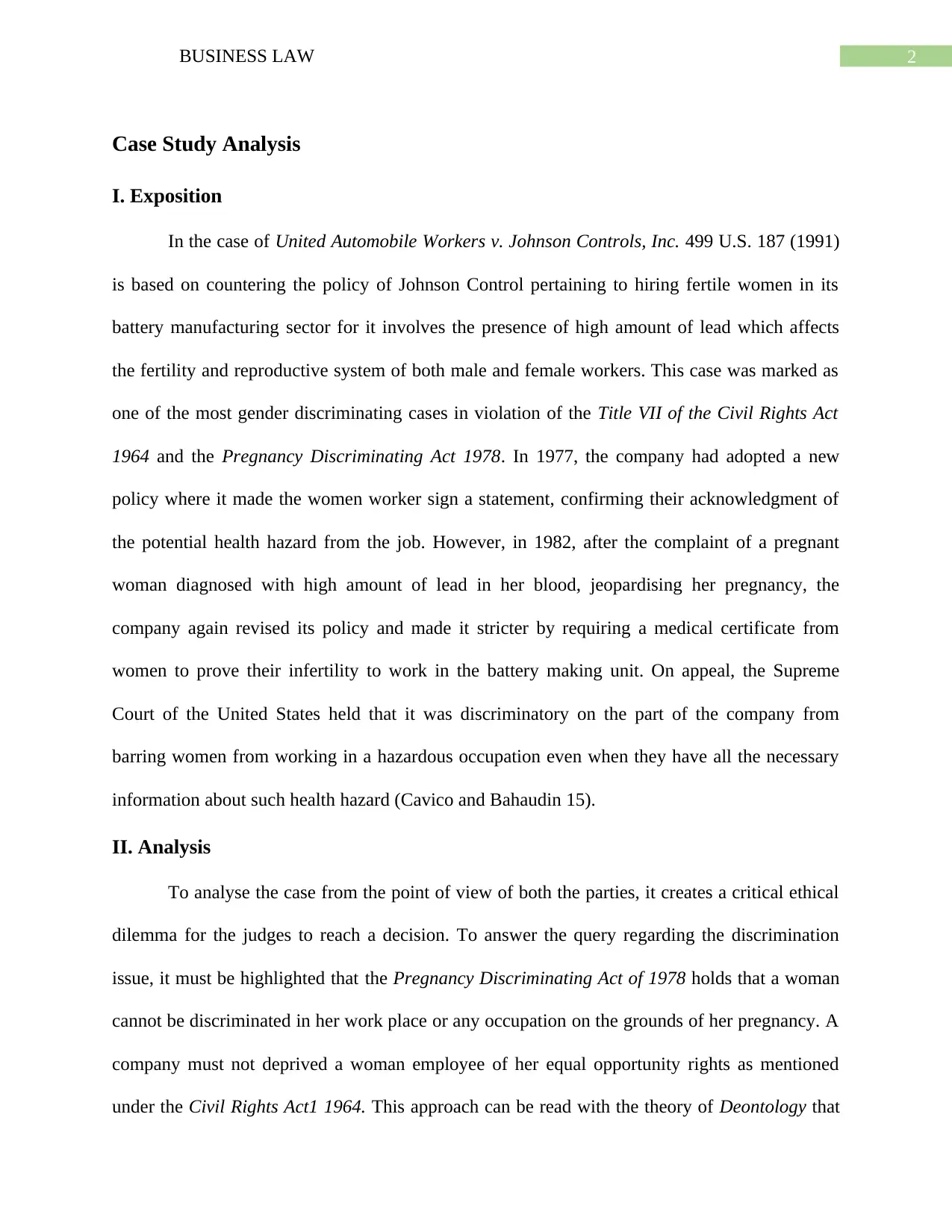
2BUSINESS LAW
Case Study Analysis
I. Exposition
In the case of United Automobile Workers v. Johnson Controls, Inc. 499 U.S. 187 (1991)
is based on countering the policy of Johnson Control pertaining to hiring fertile women in its
battery manufacturing sector for it involves the presence of high amount of lead which affects
the fertility and reproductive system of both male and female workers. This case was marked as
one of the most gender discriminating cases in violation of the Title VII of the Civil Rights Act
1964 and the Pregnancy Discriminating Act 1978. In 1977, the company had adopted a new
policy where it made the women worker sign a statement, confirming their acknowledgment of
the potential health hazard from the job. However, in 1982, after the complaint of a pregnant
woman diagnosed with high amount of lead in her blood, jeopardising her pregnancy, the
company again revised its policy and made it stricter by requiring a medical certificate from
women to prove their infertility to work in the battery making unit. On appeal, the Supreme
Court of the United States held that it was discriminatory on the part of the company from
barring women from working in a hazardous occupation even when they have all the necessary
information about such health hazard (Cavico and Bahaudin 15).
II. Analysis
To analyse the case from the point of view of both the parties, it creates a critical ethical
dilemma for the judges to reach a decision. To answer the query regarding the discrimination
issue, it must be highlighted that the Pregnancy Discriminating Act of 1978 holds that a woman
cannot be discriminated in her work place or any occupation on the grounds of her pregnancy. A
company must not deprived a woman employee of her equal opportunity rights as mentioned
under the Civil Rights Act1 1964. This approach can be read with the theory of Deontology that
Case Study Analysis
I. Exposition
In the case of United Automobile Workers v. Johnson Controls, Inc. 499 U.S. 187 (1991)
is based on countering the policy of Johnson Control pertaining to hiring fertile women in its
battery manufacturing sector for it involves the presence of high amount of lead which affects
the fertility and reproductive system of both male and female workers. This case was marked as
one of the most gender discriminating cases in violation of the Title VII of the Civil Rights Act
1964 and the Pregnancy Discriminating Act 1978. In 1977, the company had adopted a new
policy where it made the women worker sign a statement, confirming their acknowledgment of
the potential health hazard from the job. However, in 1982, after the complaint of a pregnant
woman diagnosed with high amount of lead in her blood, jeopardising her pregnancy, the
company again revised its policy and made it stricter by requiring a medical certificate from
women to prove their infertility to work in the battery making unit. On appeal, the Supreme
Court of the United States held that it was discriminatory on the part of the company from
barring women from working in a hazardous occupation even when they have all the necessary
information about such health hazard (Cavico and Bahaudin 15).
II. Analysis
To analyse the case from the point of view of both the parties, it creates a critical ethical
dilemma for the judges to reach a decision. To answer the query regarding the discrimination
issue, it must be highlighted that the Pregnancy Discriminating Act of 1978 holds that a woman
cannot be discriminated in her work place or any occupation on the grounds of her pregnancy. A
company must not deprived a woman employee of her equal opportunity rights as mentioned
under the Civil Rights Act1 1964. This approach can be read with the theory of Deontology that
⊘ This is a preview!⊘
Do you want full access?
Subscribe today to unlock all pages.

Trusted by 1+ million students worldwide
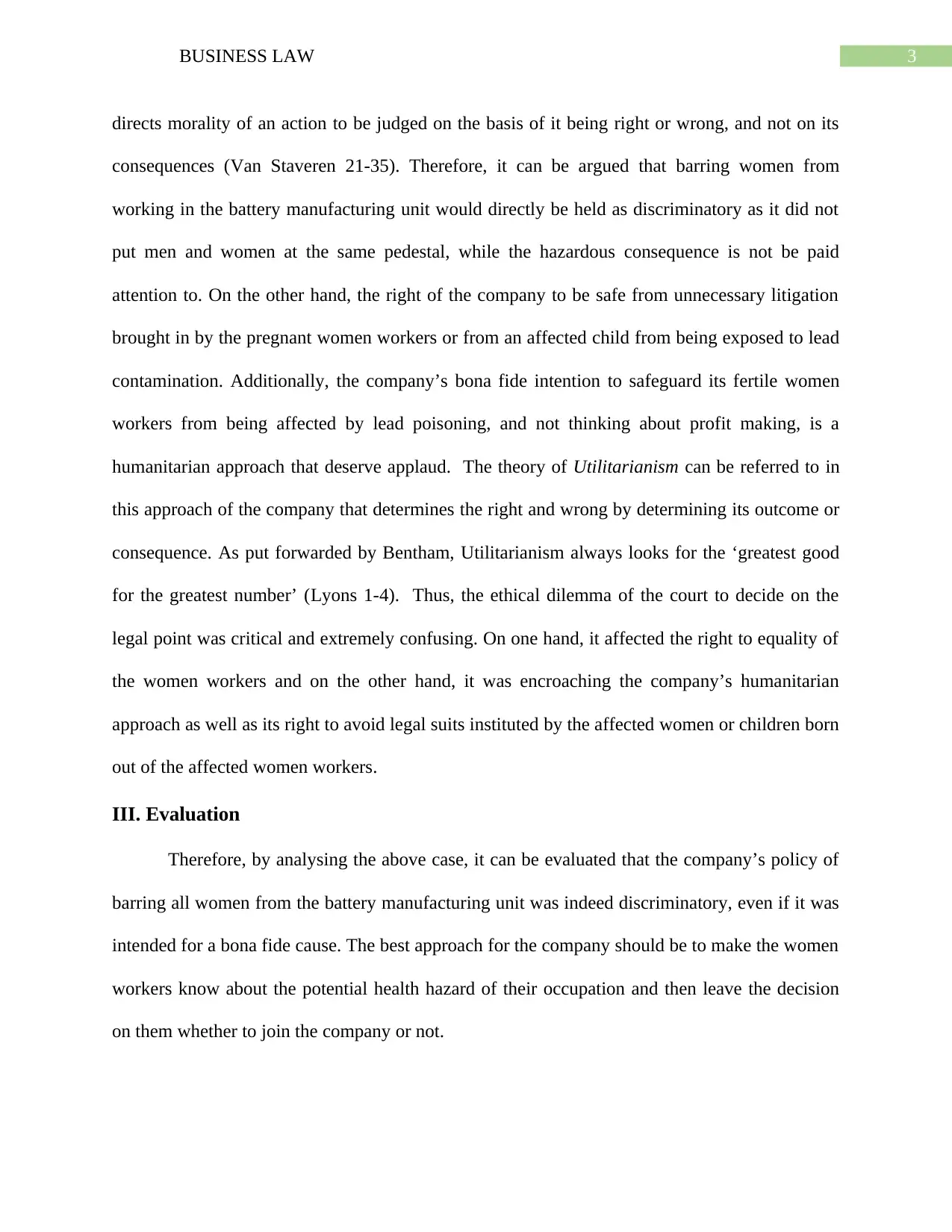
3BUSINESS LAW
directs morality of an action to be judged on the basis of it being right or wrong, and not on its
consequences (Van Staveren 21-35). Therefore, it can be argued that barring women from
working in the battery manufacturing unit would directly be held as discriminatory as it did not
put men and women at the same pedestal, while the hazardous consequence is not be paid
attention to. On the other hand, the right of the company to be safe from unnecessary litigation
brought in by the pregnant women workers or from an affected child from being exposed to lead
contamination. Additionally, the company’s bona fide intention to safeguard its fertile women
workers from being affected by lead poisoning, and not thinking about profit making, is a
humanitarian approach that deserve applaud. The theory of Utilitarianism can be referred to in
this approach of the company that determines the right and wrong by determining its outcome or
consequence. As put forwarded by Bentham, Utilitarianism always looks for the ‘greatest good
for the greatest number’ (Lyons 1-4). Thus, the ethical dilemma of the court to decide on the
legal point was critical and extremely confusing. On one hand, it affected the right to equality of
the women workers and on the other hand, it was encroaching the company’s humanitarian
approach as well as its right to avoid legal suits instituted by the affected women or children born
out of the affected women workers.
III. Evaluation
Therefore, by analysing the above case, it can be evaluated that the company’s policy of
barring all women from the battery manufacturing unit was indeed discriminatory, even if it was
intended for a bona fide cause. The best approach for the company should be to make the women
workers know about the potential health hazard of their occupation and then leave the decision
on them whether to join the company or not.
directs morality of an action to be judged on the basis of it being right or wrong, and not on its
consequences (Van Staveren 21-35). Therefore, it can be argued that barring women from
working in the battery manufacturing unit would directly be held as discriminatory as it did not
put men and women at the same pedestal, while the hazardous consequence is not be paid
attention to. On the other hand, the right of the company to be safe from unnecessary litigation
brought in by the pregnant women workers or from an affected child from being exposed to lead
contamination. Additionally, the company’s bona fide intention to safeguard its fertile women
workers from being affected by lead poisoning, and not thinking about profit making, is a
humanitarian approach that deserve applaud. The theory of Utilitarianism can be referred to in
this approach of the company that determines the right and wrong by determining its outcome or
consequence. As put forwarded by Bentham, Utilitarianism always looks for the ‘greatest good
for the greatest number’ (Lyons 1-4). Thus, the ethical dilemma of the court to decide on the
legal point was critical and extremely confusing. On one hand, it affected the right to equality of
the women workers and on the other hand, it was encroaching the company’s humanitarian
approach as well as its right to avoid legal suits instituted by the affected women or children born
out of the affected women workers.
III. Evaluation
Therefore, by analysing the above case, it can be evaluated that the company’s policy of
barring all women from the battery manufacturing unit was indeed discriminatory, even if it was
intended for a bona fide cause. The best approach for the company should be to make the women
workers know about the potential health hazard of their occupation and then leave the decision
on them whether to join the company or not.
Paraphrase This Document
Need a fresh take? Get an instant paraphrase of this document with our AI Paraphraser
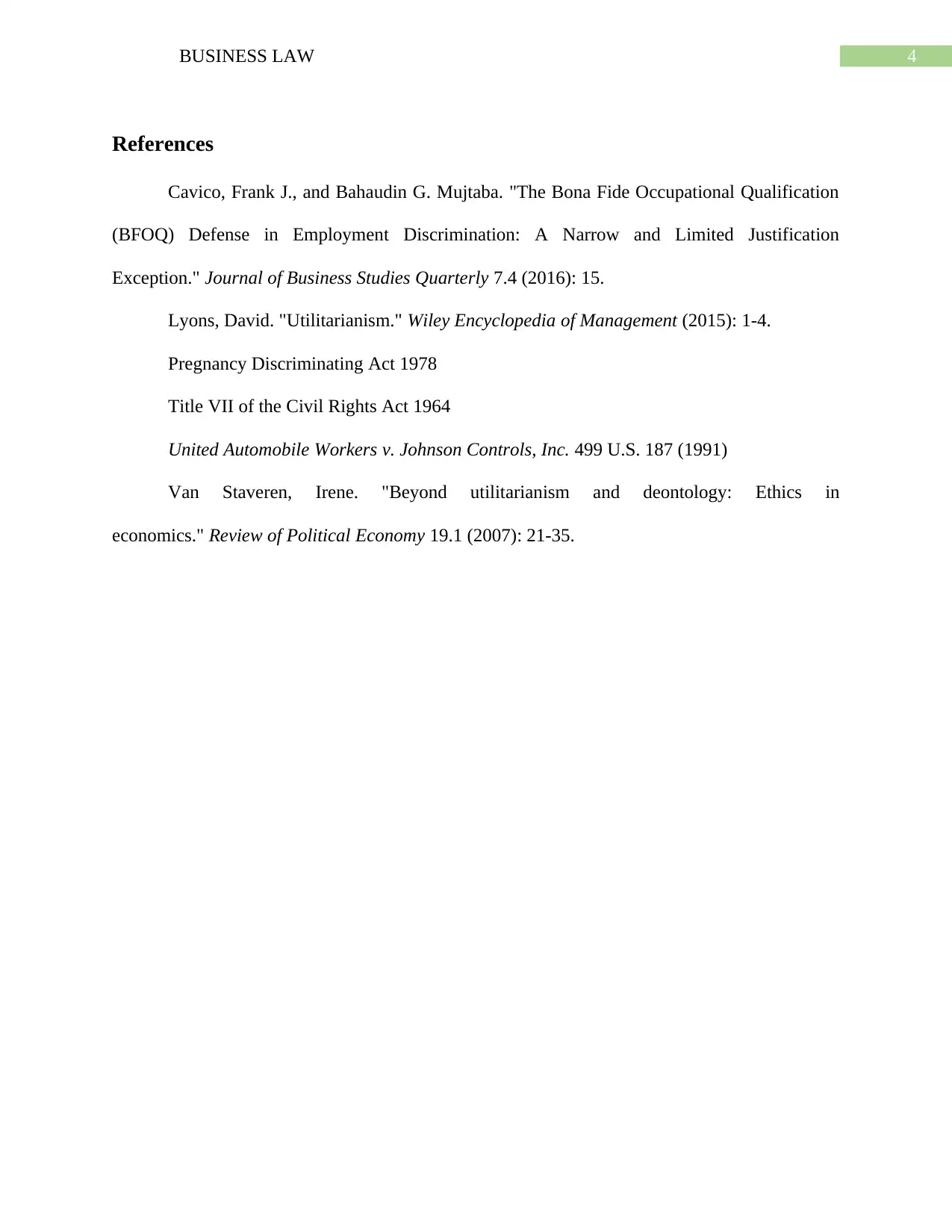
4BUSINESS LAW
References
Cavico, Frank J., and Bahaudin G. Mujtaba. "The Bona Fide Occupational Qualification
(BFOQ) Defense in Employment Discrimination: A Narrow and Limited Justification
Exception." Journal of Business Studies Quarterly 7.4 (2016): 15.
Lyons, David. "Utilitarianism." Wiley Encyclopedia of Management (2015): 1-4.
Pregnancy Discriminating Act 1978
Title VII of the Civil Rights Act 1964
United Automobile Workers v. Johnson Controls, Inc. 499 U.S. 187 (1991)
Van Staveren, Irene. "Beyond utilitarianism and deontology: Ethics in
economics." Review of Political Economy 19.1 (2007): 21-35.
References
Cavico, Frank J., and Bahaudin G. Mujtaba. "The Bona Fide Occupational Qualification
(BFOQ) Defense in Employment Discrimination: A Narrow and Limited Justification
Exception." Journal of Business Studies Quarterly 7.4 (2016): 15.
Lyons, David. "Utilitarianism." Wiley Encyclopedia of Management (2015): 1-4.
Pregnancy Discriminating Act 1978
Title VII of the Civil Rights Act 1964
United Automobile Workers v. Johnson Controls, Inc. 499 U.S. 187 (1991)
Van Staveren, Irene. "Beyond utilitarianism and deontology: Ethics in
economics." Review of Political Economy 19.1 (2007): 21-35.
1 out of 5
Related Documents
Your All-in-One AI-Powered Toolkit for Academic Success.
+13062052269
info@desklib.com
Available 24*7 on WhatsApp / Email
![[object Object]](/_next/static/media/star-bottom.7253800d.svg)
Unlock your academic potential
Copyright © 2020–2026 A2Z Services. All Rights Reserved. Developed and managed by ZUCOL.



